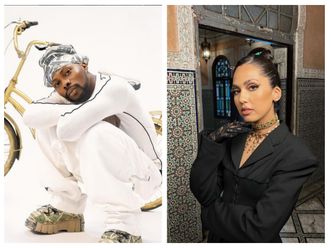
The holy month is a great time to spend with family - fasting, praying, and celebrating the strengthening of faith - but it is also a time for sharing meals with friends, colleagues, and neighbours. The hunger pangs of the day serve as a reminder of those without food, and many fasting Muslims feed the needy during the month. Food is the focus of communal and community events held during Ramadan and Eid, and in many kitchens, it is a time for remembering and reviving culinary traditions.
In a broader sense, the role of food during this season can be seen as a bridge between cultures. And partaking in a Ramadan meal is a significant step for non-Muslims to better understand Islam, and Arab cultures.
Although the fast is always broken according to tradition, how an iftar is organised, and what is served, depends greatly on country and culture, and is based on both custom and convenience. In Turkey, for instance, many culinary traditions of Ramadan are reminiscent of an era when elaborate preparations were made for the holy month. Gabir Solak, a sales executive who works at Jebel Ali, says his grandparents in Istanbul yearn for an older time when food and ingredients consumed during Ramadan were bought when they were cheap or plentiful, and stored carefully. "There are special foods collectively known as Ramazanlik - meat products such as sucuk, pastirma and kavruma, dried beans, pickles and cheeses, and fruits made into jams - and the older generations used to buy and prepare these in large quantities, in advance."
Traditional treats
Abdulaziz Bey describes this in his book, Ottoman Customs, Ceremonies and Expressions: "Ramadan was of great importance in the Ottoman Empire. Preparations and purchasing began two, three months ahead. People bought household goods in larger quantities. They had copper frying pans and pots resurfaced with tin. Everyone who could, would buy fine coffee cups, water glasses, and special spoons with whistles. In the sweet shops, samples of various preserves were laid out, decked with sweets, and ingredients for sherbet cups known as hamasi. Those who were well-off sent Ramadan provisions to relatives, friends, and neighbours."
Solaksays he has grown up in an era where convenience overrules tradition. "Preparing for Ramadan will soon become a nostalgic memory in my country, but we do have one tradition from the past. Almost all business owners still distribute Ramazanlik to their employees, as an extension of our old custom," he explains.
Tradition and nostalgia shape the practices of fasting Muslims of different nationalities, especially when they observe the fast in another country. Frenchwoman Sabrina M. is of Algerian ethnicity and is celebrating her first Ramadan in Dubai. "At my parents' apartment in Paris, iftar was always with the whole family around the table, and this is how I always remember my best iftars.
"We always exchanged our iftar dishes with our neighbours, so the table heaved with different dishes from Algeria and Morocco. My mom is a great cook, and she ensured that the kesra, the traditional Algerian flat bread, was made fresh every day. The main Algerian soup for Ramadan is the chorba. This dish of meat and vegetables cooked in a spicy broth is a must-have."
Food markets
The marketing and business development manager says that although the region is already associated with legendary hospitality, Ramadan highlights it. "Food is an integral part of sharing, and during Ramadan it takes on additional dimensions. You take time out to cook, you try and have friends and family over, and there is an extra flavour to the food."
Flavour takes on many hues in Mumbai, at dedicated Ramadan food markets. Small lanes are lined with food stalls laden with a variety of foods celebrating the occasion, especially the stretch between Bhendi Bazaar and Mohammed Ali Road. The area comes alive immediately after sunset, and the air is redolent with aromas of toasted spices, frying meat and delicious sweets. On offer is an array of delicacies - starters and sweetmeats - crowd favourites include egg paranthas, boti kebab, biryani, sevayia, phirni, aflatoon, malai khaja, shahi halwa and malpuwa.
"It is my favourite place in the world, with some of my best memories of Ramadan," says Indian expatriate Rahat Ali, with a nostalgic glint in her eye.
"As a rozadar (a Muslim who fasts), this is a celebration of our fasting. But the important thing is that this food is not restricted to rozadars. I always had Hindu and Christian friends in tow, and they enjoyed it as much as I did. People of all faiths and all walks of life come to eat and enjoy here, and we often saw famous actors and politicians. This Ramadan fare does not differentiate between rich and poor, celebrity and common man, or Muslims and non-Muslims," declares the Sharjah resident.
A celebration of sorts
Palestinian Shahd Bessisso is a 20-year-old who was raised in Dubai, and now studies at the University of Kent, UK. She concurs that although it is the month of fasting, food plays an important role during Ramadan. "Food is greatly appreciated; it is seen as a blessing and as a celebration. And we no longer take it for granted."
Bessisso is nostalgic about her family's traditions. "On the first day of Ramadan and Eid, we always have Mansaf. It is a traditional Jordanian dish, which I personally think only my grandmother has mastered. Iftar is more special than any other meal, as we are all present around the table, no one has other plans, and everyone appreciates the occasion."
Dubaibased paralegal Mohammed Ali says Ramadan is a joyous event in his native Cairo, and involves sharing meals with family and maintaining age-old traditions.
"Most people still spend the first day of Ramadan at a family reunion, usually in the grandparents' house. After the first few days they start going out after iftar, with friends and colleagues. Since many Egyptians prefer to spend their time in the old- fashioned atmosphere of a cafe, most hotels now erect large tents and furnish it in traditional style. After iftar, people sit back and enjoy snacks, water pipes, board games, and sentimental songs at these tents. It is all very nostalgic, and it strengthens relations between people," he explains.
Strengthening relations between Muslims and non-Muslims is best exemplified by 'Sharing Ramadan', an annual campaign initiated by the Council on American Islamic Relations (CAIR). The organisation's National Executive Director Nihad Awad has urged Muslim communities across the US to reach out to non-Muslims, by inviting them to iftars. “In order to enhance interfaith relations, it is imperative that American Muslims reach out to their neighbours of all beliefs to offer balanced and accurate information about Islam and the Muslim community."
In cosmopolitan UAE, Muslims need no reminders to share their iftar with friends from other faiths, and invitations are extended to colleagues, clients, and neighbours. It is also not uncommon for a Muslim to be invited to iftars by non-Muslims.
"There are untold rewards and blessings for sharing food during Ramadan," says Rahat, who hosts at least a dozen iftars at her home during the month. "An invitation to iftar is a beautiful way to foster understanding and unity. At the end of the evening, everyone will have a sense of contentment and camaraderie, and that is a gift in every sense of the word."











